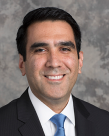Perched in my Abrams battle tank in the middle of Baghdad, I spoke with a young soldier, a Mexican immigrant who spoke little English, about his background and mine.

We talked about family, his home – both in Mexico and the US, and about the paths we’d taken that had led us halfway around the world. He asked about West Point and about the requirements for becoming an officer, and after a few minutes of listening, he smiled and said, “Señor, usted es un orgullo Hispano.”
Roughly translated, the young soldier was telling me that I was a source of pride for Hispanics.
Those familiar with U.S. Spanish-language television, however, will undoubtedly find the humor in his quip since it also mimicked a long-running series of focus pieces highlighting Hispanic role models or “orgullos Hispanos.”
Of course, in my mind, nothing could be further from the truth. In my view, I was simply another new lieutenant trying to lead soldiers in combat while avoiding his own platoon sergeant’s wrath for one of the countless boneheaded moves for which new lieutenants are infamous.
But to this young Hispanic soldier who hoped to make a life for himself in America, I was someone to look up to by virtue of my education, accomplishments, and position.
That lesson remains with me even as I have traded the profession of arms for the profession of law, and as Hispanic Heritage Month gives us the opportunity to reflect on the Hispanic journey in the United States, it serves as a simple reminder of the role we can all play in inspiring others.
Before “Yes We Can” was a presidential campaign slogan, it was the rallying cry for Hispanic farm workers who chanted “Si Se Puede” as they fought for fair wages and humane working conditions. The refrain resonated with them because historically they had been told in numerous facets of American life that they could not – they could not eat at certain restaurants, they could live in certain parts of town, they could not go to certain schools, they could not be doctors or lawyers.
In short, they had been told they could not partake in the American dream.
Forty years later, while Hispanics have made much progress, much progress remains to be made. Large swaths of the Hispanic community suffer from a crisis of confidence resulting from decades of discrimination, both explicit and implicit.
To many Hispanics, America is still the land of “No You Can’t” – or, even worse, “No I Can’t” – rather than the country of “Yes We Can.”Recent immigrants, including some in the military putting their lives on the line defending our freedoms in far off places, continue to be demeaned and degraded by those in positions of power.
If America is to live up to its ideal of equality and opportunity for all, the Hispanic community will continue to need role models. Sonia Sotomayor, Cesar Chavez, Roberto Clemente and others of their stature certainly serve to inspire Hispanics of all generations, but one need not be a historical figure to be a figure in someone’s history. And one need not be Hispanic to be a role model to Hispanics.
I have been fortunate in the experiences I’ve had and what I’ve been able to accomplish, from West Point to a successful military career as an armored cavalry officer and JAG attorney to a practicing trial lawyer in a field with relatively few Hispanics.
While hard work and focus have contributed, I would have accomplished none of those things without role models to help and inspire me along the way.
From my mother and father who marched for greater rights for Hispanics and have been a constant source of guidance and support and the West Point admissions officer who helped me gain entrance to my superior officers, colleagues, and soldiers in the military who saw only Army green and to those at AZA, who value diversity – the firm’s full name, which gives rise to the slogan “Tough Name. Tougher Opponent,” leaves no doubt – and who took a chance on an Army lawyer with a different career path, my life would have been very different without role models and helping hands along the way.
So, in light of Hispanic Heritage Month, and in furtherance of what we know our country can be, I take this opportunity to encourage everyone to aim to inspire, to be a role model, and to show that America is indeed a country of “Si Se Puede.”
Rey Flores is a Houston trial lawyer with litigation boutique Ahmad, Zavitsanos, Anaipakos, Alavi & Mensing P.C., or AZA.
